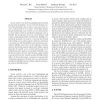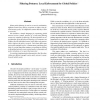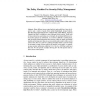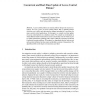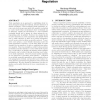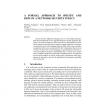SP
2010
IEEE
14 years 11 months ago
2010
IEEE
—Web browsers’ access control policies have evolved
COMPSAC
2007
IEEE
14 years 11 months ago
2007
IEEE
Access control is one of the most fundamental and widely used security mechanisms. Access control mechanisms control which principals such as users or processes have access to whi...
ACSAC
2009
IEEE
14 years 11 months ago
2009
IEEE
Abstract--Current Network Access Control (NAC) technologies manage the access of new devices into a network to prevent rogue devices from attacking network hosts or services. Typic...
SP
1997
IEEE
14 years 11 months ago
1997
IEEE
When packet filtering is used as a security mechanism, different routers may need to cooperate to enforce the desired security policy. It is difficult to ensure that they will d...
ICCS
2001
Springer
15 years 6 hour ago
2001
Springer
Abstract. Many different access control policies and models have been developed to suit a variety of goals; these include Role-Based Access Control, One-directional Information Flo...
ACSAC
2002
IEEE
15 years 16 days ago
2002
IEEE
Active Spaces are physical spaces augmented with heterogeneous computing and communication devices along with supporting software infrastructure. This integration facilitates coll...
DEXA
2003
Springer
15 years 23 days ago
2003
Springer
Abstract. Access control policies are security policies that govern access to resources. Real-time update of access control policies, that is, updating policies while they are in e...
WPES
2003
ACM
15 years 24 days ago
2003
ACM
Trust negotiation is an approach to establishing trust between strangers through the bilateral, iterative disclosure of digital credentials. Under automated trust negotiation, acc...
POLICY
2004
Springer
15 years 27 days ago
2004
Springer
This work proposes a XML-based framework for distributing and enforcing RSVP access control policies, for RSVP-aware application servers. Policies are represented by extending XAC...
IFIP
2004
Springer
15 years 28 days ago
2004
Springer
Current firewall configuration languages have no well founded semantics. Each firewall implements its own algorithm that parses specific proprietary languages. The main conseq...

